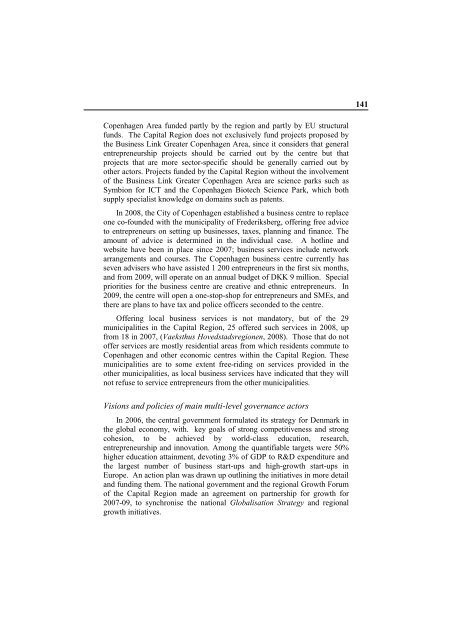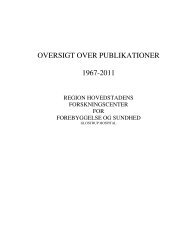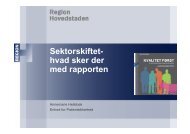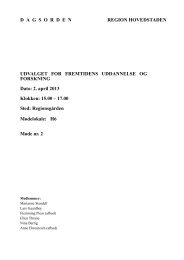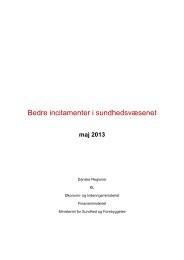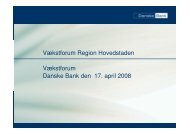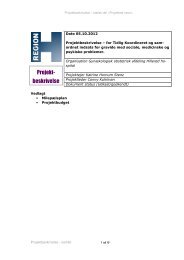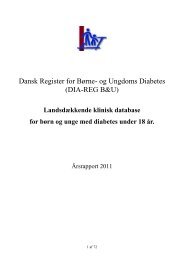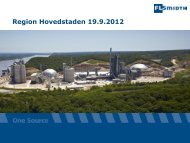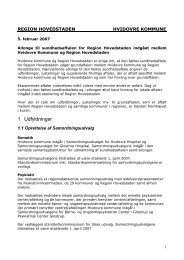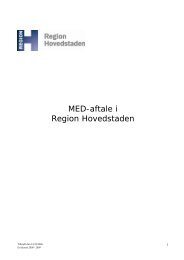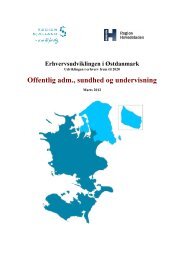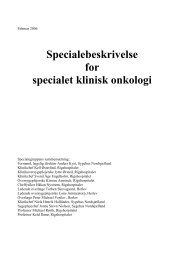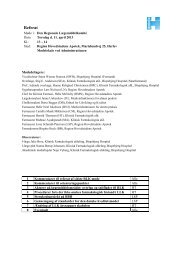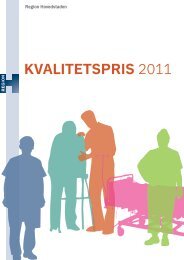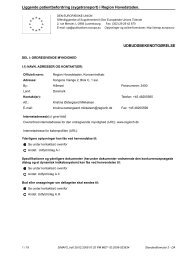Territorial Review Copenhagen - Region Hovedstaden
Territorial Review Copenhagen - Region Hovedstaden
Territorial Review Copenhagen - Region Hovedstaden
You also want an ePaper? Increase the reach of your titles
YUMPU automatically turns print PDFs into web optimized ePapers that Google loves.
141<br />
<strong>Copenhagen</strong> Area funded partly by the region and partly by EU structural<br />
funds. The Capital <strong>Region</strong> does not exclusively fund projects proposed by<br />
the Business Link Greater <strong>Copenhagen</strong> Area, since it considers that general<br />
entrepreneurship projects should be carried out by the centre but that<br />
projects that are more sector-specific should be generally carried out by<br />
other actors. Projects funded by the Capital <strong>Region</strong> without the involvement<br />
of the Business Link Greater <strong>Copenhagen</strong> Area are science parks such as<br />
Symbion for ICT and the <strong>Copenhagen</strong> Biotech Science Park, which both<br />
supply specialist knowledge on domains such as patents.<br />
In 2008, the City of <strong>Copenhagen</strong> established a business centre to replace<br />
one co-founded with the municipality of Frederiksberg, offering free advice<br />
to entrepreneurs on setting up businesses, taxes, planning and finance. The<br />
amount of advice is determined in the individual case. A hotline and<br />
website have been in place since 2007; business services include network<br />
arrangements and courses. The <strong>Copenhagen</strong> business centre currently has<br />
seven advisers who have assisted 1 200 entrepreneurs in the first six months,<br />
and from 2009, will operate on an annual budget of DKK 9 million. Special<br />
priorities for the business centre are creative and ethnic entrepreneurs. In<br />
2009, the centre will open a one-stop-shop for entrepreneurs and SMEs, and<br />
there are plans to have tax and police officers seconded to the centre.<br />
Offering local business services is not mandatory, but of the 29<br />
municipalities in the Capital <strong>Region</strong>, 25 offered such services in 2008, up<br />
from 18 in 2007, (Vaeksthus Hovedstadsregionen, 2008). Those that do not<br />
offer services are mostly residential areas from which residents commute to<br />
<strong>Copenhagen</strong> and other economic centres within the Capital <strong>Region</strong>. These<br />
municipalities are to some extent free-riding on services provided in the<br />
other municipalities, as local business services have indicated that they will<br />
not refuse to service entrepreneurs from the other municipalities.<br />
Visions and policies of main multi-level governance actors<br />
In 2006, the central government formulated its strategy for Denmark in<br />
the global economy, with. key goals of strong competitiveness and strong<br />
cohesion, to be achieved by world-class education, research,<br />
entrepreneurship and innovation. Among the quantifiable targets were 50%<br />
higher education attainment, devoting 3% of GDP to R&D expenditure and<br />
the largest number of business start-ups and high-growth start-ups in<br />
Europe. An action plan was drawn up outlining the initiatives in more detail<br />
and funding them. The national government and the regional Growth Forum<br />
of the Capital <strong>Region</strong> made an agreement on partnership for growth for<br />
2007-09, to synchronise the national Globalisation Strategy and regional<br />
growth initiatives.


